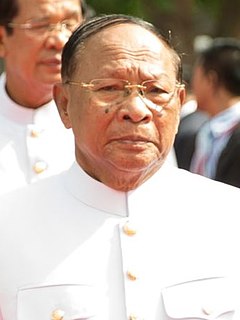These are lists of incumbents, including heads of states or of subnational entities.
President is a common title for the head of state in most republics. The president of a nation is, generally speaking, the head of the government and the fundamental leader of the country or the ceremonial head of state.

The Supreme Soviet of the Union of Soviet Socialist Republics was, beginning in 1936, the most authoritative legislative body of the Union of Soviet Socialist Republics (USSR), and the only one with the power to approve constitutional amendments. Prior to 1936, the Congress of Soviets was the supreme legislative body. During 1989–1991 a similar, but not identical structure was the supreme legislative body. The Supreme Soviet elected the USSR's collective head of state, the Presidium; and appointed the Council of Ministers, the Supreme Court, and the Procurator General of the USSR.
The head of government is either the highest or the second-highest official in the executive branch of a sovereign state, a federated state, or a self-governing colony, autonomous region, or other government who often presides over a cabinet, a group of ministers or secretaries who lead executive departments. In diplomacy, "head of government" is differentiated from "head of state" although in many countries, for example the United States, they are the same person.
Premier is a title for the head of government in central governments, state governments and local governments of some countries. A second in command to a premier is designated as a deputy premier.
A Council of State is a governmental body in a country, or a subdivision of a country, with a function that varies by jurisdiction. It may be the formal name for the cabinet or it may refer to a non-executive advisory body associated with a head of state. In some countries it functions as a supreme administrative court and is sometimes regarded as the equivalent of a privy council.
Council of Ministers is a traditional name given to the supreme executive organ in some governments. It is usually equivalent to the term cabinet. The term Council of State is a similar name that also may refer to a cabinet, but the terms are not equal in certain countries. Councils of Ministers are usually composed of those government ministers who are responsible for a ministry. They are usually led by a President of the Council of Ministers, a term that is commonly translated, or used synonymously, as prime minister or premier.

Mário Alberto Nobre Lopes Soares, GColTE, GCC, GColL was a Portuguese politician, who served as prime minister of Portugal from 1976 to 1978 and from 1983 to 1985, and subsequently as the 17th president of Portugal from 1986 to 1996. He was the first secretary-general of the Socialist Party, from its foundation in 1973 to 1986.

The Cambodian People's Party (CPP) is a Cambodian political party which has ruled Cambodia since 1979.
A dominant-party system, or one-party dominant system, is a political occurrence in which a single political party continuously dominates election results over running opposition groups or parties. Any ruling party staying in power for more than one consecutive term may be considered a dominant party.

Heng Samrin is a Cambodian politician who serves as the President of the National Assembly of Cambodia. Between 1979 and 1992, he was the de facto leader of the Hanoi-backed People's Republic of Kampuchea (1979–1989) and State of Cambodia (1989–1992) and General Secretary of the Kampuchean People's Revolutionary Party from 1981 to 1991.
Son Sann was a Cambodian politician and anti-communist resistance leader who served as the 22nd Prime Minister of Cambodia (1967–68) and later as President of the National Assembly (1993). A devout Buddhist, he was married and fathered seven children. His full honorary title is "Samdech Borvor Setha Thipadei Son Sann".

The People's Republic of Kampuchea (PRK) was a historical partially recognised state in Southeast Asia supported by Vietnam. It was founded in Cambodia by the Kampuchean United Front for National Salvation, a group of Cambodian communists who were dissatisfied with the Khmer Rouge due to its oppressive rule of Cambodia and defected from it after the overthrow of Democratic Kampuchea, Pol Pot's government. Brought about by an invasion from Vietnam, which routed the Khmer Rouge armies, it had Vietnam and the Soviet Union as its main allies.
The decolonization of Asia was the gradual growth of independence movements in Asia, leading ultimately to the retreat of foreign powers and the creation of a number of nation-states in the region.

Lev Alekseyevich Voronin was a Soviet and Russian official. He served as a First Deputy Chairman of the Council of Ministers, literally the Vice-Premier of the Soviet Union, from 1989 to 1990. Responsible for the "general issues" of the cultural and economic administration of the Soviet Union during the late Gorbachev Era, Voronin became acting Chairman of the Council of Ministers in between Nikolai Ryzhkov's hospitalization and Valentin Pavlov's election as Prime Minister. Voronin worked as a banker following the dissolution of the Soviet Union.





